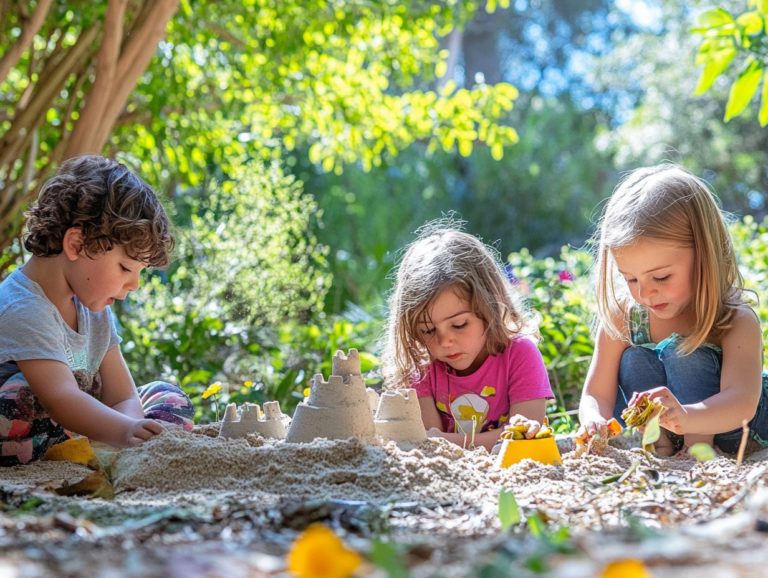How Does Mindful Parenting Affect Child Development?
Mindful parenting transcends mere buzzword status; it represents a transformative approach that profoundly influences both you and your child, particularly in preschool children.
By cultivating emotional regulation, enhancing communication, and boosting self-esteem, mindful parenting establishes a solid foundation for your child’s healthy development, impacting their social behavior and decision-making skills.
Yet, the rewards aren’t limited to your child alone you’re likely to find your own relationships flourishing, your self-awareness heightened, and your stress levels diminished, reducing overall parenting stress.
This article delves into the impacts of mindful parenting on your child’s growth, including their mental health, and provides practical tips for embracing this enriching practice in your own life.
Contents
- Key Takeaways:
- How Does Mindful Parenting Affect Child Development?
- What Are The Benefits Of Mindful Parenting For Parents?
- How Can Parents Practice Mindful Parenting?
- Frequently Asked Questions
- What is mindful parenting?
- How does mindful parenting affect child development?
- Does practicing mindful parenting improve parent-child relationships?
- Can mindful parenting help reduce behavioral problems in children?
- Is mindful parenting beneficial for all parents?
- Are there any tips for incorporating mindful parenting into daily routines?
Key Takeaways:
How Does Mindful Parenting Affect Child Development?
Mindful parenting plays a crucial role in child development, creating a nurturing environment that nurtures emotional regulation, strengthens the parent-child bond, and encourages positive behaviors while reducing negative ones.
By embracing mindfulness techniques, you can gain a deeper understanding of your child’s emotional needs, paving the way for healthier developmental outcomes.
Studies indicate that children raised with mindfulness practices often display enhanced emotional self-regulation, a vital skill for traversing the complexities of social interactions.
1. Emotional Regulation and Cognitive Emotion Regulation
Emotional regulation stands as a cornerstone of child development, heavily shaped by mindful parenting practices that enhance emotional awareness and resilience in children both of which are vital for their overall mental health.
By weaving in techniques like active listening, validating feelings, and modeling calm responses, you can create an environment that nurtures emotional growth. Mindful parenting invites you to be fully present and attuned to your child’s emotional needs, enabling you to help them recognize and manage their feelings effectively. For deeper insights, consider exploring mindful parenting training and parenting strategies to enhance your approach.
This proactive approach not only alleviates your own stress as a parent but also reduces the chances of behavioral issues, leading to a more harmonious family dynamic. Essentially, integrating mindfulness into your parenting style promotes healthier avenues for emotional expression, setting the stage for your child’s long-term emotional intelligence and resilience.
2. Improved Communication
Mindful parenting cultivates a deeper connection between you and your child, enhancing interactions that are grounded in empathy and understanding key ingredients for fostering healthy developmental communication skills and reducing conflict.
By weaving mindfulness practices into your daily routine, such as active listening and responding without judgment, you can create a safe space where your child feels comfortable expressing themselves freely.
For example, when your child opens up about a challenging day at school, a mindful parent like you might choose to engage in reflective listening instead of jumping straight to solutions. This allows your child to fully process their emotions. Professionals such as Rachael Green and Yolanda Renteria often recommend this approach in mindful parenting training sessions.
Such an approach not only bolsters your child s self-esteem but also equips them with crucial decision-making skills and reduces the risk of ADHD symptoms, enabling them to evaluate their feelings and make choices that align with their needs.
Through these meaningful interactions, your child learns the significance of compassion and thoughtful communication, skills they will carry into their relationships with peers and others as they grow.
3. Better Self-Esteem
Through consistent, supportive parenting and a mindful approach, you can help your children cultivate better self-esteem. When they feel valued and understood, it reinforces their positive behaviors and emotional needs.
By actively listening and responding to your children’s feelings, you create a safe space for them to express themselves without the fear of judgment. This emotional attunement validates their experiences and fosters a strong sense of belonging and acceptance.
Celebrate their achievements, big or small. This helps them recognize their worth and promotes confidence. Encouraging them to tackle challenges and learn from their mistakes builds resilience, which is essential for confidence development. You can further support this process by taking a parenting styles quiz to understand your strengths and areas for improvement.
Over time, this nurturing approach strengthens their self-worth, making them more likely to engage positively with others and form healthy relationships.
4. Increased Empathy
Increased empathy is one of the standout benefits of mindful parenting, as it nurtures children’s emotional awareness and helps them grasp the feelings of others. This ultimately fosters positive social behavior and reduces instances of depression.
By embracing mindfulness practices, you create an environment where your children learn the invaluable skill of pausing and reflecting before reacting in social situations. This reflective space allows them to delve deeper into the perspectives and feelings of those around them. Incorporating compassionate parenting techniques can further enhance this development.
For instance, when your child encounters a peer in distress, mindfulness techniques can guide them to approach the situation with compassion rather than jumping to conclusions. Research indicates that households that prioritize open communication and emotional honesty effectively promote empathetic responses in children.
As a result, incorporating these strategies nurtures your child’s ability to feel empathy and enables them to express it through supportive actions, significantly enhancing their social interactions.
5. Reduced Stress and Anxiety

Mindful parenting is an effective strategy for reducing stress and anxiety in both you and your children. By emphasizing ways to manage feelings and practices that help you stay calm and focused, it fosters a calmer family dynamic.
Creating an environment that encourages greater self-awareness and compassion allows you to significantly lessen the pressures that come with daily parenting challenges. As you model these emotional skills, your children will learn to navigate their feelings more effectively, resulting in healthier interactions within your family unit.
Engaging in mindful parenting also invites deeper connections among family members, cultivating a nurturing atmosphere that promotes resilience. This approach alleviates stress for you as a parent and equips your children with essential tools for managing their emotions. Ultimately, this enhances the overall mental well-being of everyone involved. Exploring mindfulness-based stress reduction techniques will also support this process.
What Are The Benefits Of Mindful Parenting For Parents?
Are you ready to transform your parenting experience? Embracing mindful parenting unlocks a wealth of advantages for you as a parent. It fosters a deeper connection with your child, heightens your self-awareness, alleviates stress, and sharpens your coping skills. These benefits are often emphasized in resources like Verywell Mind.
These elements collectively pave the way for a more harmonious and fulfilling family life.
1. Improved Parent-Child Relationship
An improved parent-child relationship stands as one of the most significant benefits of mindful parenting. It nurtures emotional regulation and understanding through compassionate practices. This can be evaluated using tools such as the Parenting Stress Index, a tool that measures parenting stress.
This approach invites you to engage in active listening and empathetic responses, allowing your children to feel heard and valued. As you become more attuned to their emotional states, you not only model effective communication but also cultivate a safe environment for them to express their feelings. Exploring the Parent-Child Interactions scale can provide further insights into this dynamic.
As a result, both you and your children experience a deeper connection. You learn to respond thoughtfully rather than react impulsively to challenging behaviors. This intentional practice fosters constructive discussions, enhances conflict resolution skills, and ultimately nurtures a sense of trust that strengthens your emotional bond over time. Adopting mindful parenting techniques can significantly aid in this process.
2. Increased Self-Awareness
Increased self-awareness emerges as a pivotal outcome of mindful parenting. You become more attuned to your own emotional needs and parenting behaviors. This newfound clarity allows you to critically reflect on your parenting style and its impact on your child s development.
With this heightened awareness, you are encouraged to pause and contemplate the impact your responses may have on your children. Engaging in mindfulness practices, such as meditation or deep breathing exercises, helps you gain a clearer understanding of your triggers and emotional patterns. These mindfulness techniques are essential for reducing parenting stress.
This reflective approach enriches the parent-child relationship and fosters a more compassionate environment where your children can truly thrive. As you learn to navigate your reactions with intention, you create opportunities for growth and connection. You transform your home life into a more harmonious space where both your needs and those of your children are respected.
3. Reduced Parental Stress
Mindful parenting plays a pivotal role in reducing parental stress. It primarily incorporates mindfulness-based stress reduction techniques that enhance your emotional awareness and provide essential support. These strategies can significantly contribute to lowering the Parenting Stress Index.
By embracing practices such as deep breathing, meditation, and reflective listening, you can cultivate a greater sense of calm and presence during those challenging moments that inevitably arise. This approach empowers you to tackle stressful moments head-on with confidence, allowing you to respond to stressful situations with thoughtful consideration, rather than letting reactive emotions take the reins. This can help in conflict resolution and better management of negative behaviors.
As you hone your ability to stay grounded, you ll find yourself becoming more attuned to your own feelings as well as those of your children. This heightened emotional awareness not only helps you navigate daily challenges more effectively but also fosters a deeper connection in your parent-child relationship.
In turn, this creates a nurturing environment that alleviates tension and anxiety. It benefits both you and your children by promoting social behavior and reducing parenting stress.
4. Better Coping Skills
Better coping skills stem directly from mindful parenting. It equips you with emotional regulation strategies and effective parenting strategies to navigate the stresses of parenting.
By cultivating a deeper awareness of your emotions and reactions, you can respond more thoughtfully to the myriad challenges that arise in daily life. This heightened sense of presence enables you to model resilience for your children, demonstrating how to manage difficult feelings in constructive ways and improving their emotional self-regulation.
Practicing mindfulness encourages you to pause and reflect before reacting. This provides the opportunity to choose responses that nurture both your wellbeing and your child s emotional needs. These practices not only enhance your family dynamic but also create a foundation of trust and security that fosters emotional growth and stability for everyone involved.
How Can Parents Practice Mindful Parenting?

Mindful parenting is essential for nurturing your child’s emotional development and strengthening your relationship. By weaving a tapestry of mindfulness techniques and practices into your daily routines, you not only enhance your emotional awareness but also cultivate a nurturing and supportive environment for your parenting journey. This enables compassionate parenting.
1. Embrace Meditation and Mindfulness
Meditation and mindfulness exercises form the cornerstone of mindful parenting. They enhance emotional regulation and cultivate skills to manage emotions.
These practices include structured methods like guided meditations and spontaneous techniques such as mindful breathing. You can seamlessly weave short mindfulness exercises into your daily routines pay attention to the sensations while preparing meals or engage in mindful listening during conversations. Such practices improve decision-making skills and reduce parenting stress.
This intentional focus fosters a calm atmosphere, enabling you to respond thoughtfully in stressful situations rather than react impulsively. By nurturing these techniques, you can transform the emotional landscape of your home, promoting resilience and creating a nurturing environment where both you and your children can thrive emotionally.
For structured learning, consider mindful parenting training or resources such as mindfulness-based stress reduction.
2. Active Listening and Non-Judgmental Communication
Active listening and non-judgmental communication are crucial elements of mindful parenting. They offer you the tools to better address your child’s emotional needs while alleviating your own parenting stress.
By genuinely engaging with your child during conversations, you can cultivate an atmosphere of trust and openness. This supportive environment encourages your child to express their thoughts and feelings freely, ultimately fortifying your emotional bond.
To effectively practice active listening, maintain eye contact and employ affirming gestures, signaling to your child that their voice matters. Reflective listening is another valuable technique; by paraphrasing what your child has shared, you confirm your understanding and show that you are truly present in the moment.
Engaging in these supportive techniques can greatly benefit both you and your child. Adopting a non-judgmental approach involves refraining from labeling emotions, teaching your child that experiencing a wide range of feelings is a natural and healthy part of their development.
This approach is at the core of compassionate parenting, which fosters a nurturing environment. Start practicing these techniques today to strengthen your bond with your child!
3. Setting Boundaries and Consistent Discipline
Setting boundaries and implementing consistent discipline are vital components of mindful parenting. This cultivates a nurturing environment for your children to flourish and promotes positive behaviors.
These practices lay down clear expectations and instill a sense of security and trust. When you communicate limits effectively, you help your children grasp the framework within which they can explore and grow. This understanding is critical for their emotional development, enabling them to learn self-regulation and empathy.
Consistent discipline reinforces positive behaviors, encouraging your children to make choices that reflect respect for themselves and others. Ultimately, these facets of mindful parenting play a significant role in raising emotionally intelligent individuals who can face life’s challenges with confidence and resilience.
For further guidance, resources like Mindful Parenting Training and Verywell Mind can be very helpful.
4. Practicing Gratitude and Appreciation
Practicing gratitude and appreciation is an essential mindfulness technique in parenting. It enhances positive behaviors and helps in managing emotions in children while fostering a nurturing family atmosphere.
By weaving simple expressions of thanks and recognition into your everyday interactions, you can cultivate an environment that encourages your children to identify and articulate their feelings. For instance, after meals, take a moment to share what each family member is thankful for. This not only strengthens family bonds but also instills a sense of responsibility and awareness in your youngsters. This practice is also beneficial for promoting decision-making and improving social behavior in children.
You can inspire your kids to approach life with a more optimistic mindset through this practice, building resilience and equipping them with vital emotional skills. When children observe gratitude actively being practiced by you, they are more likely to adopt these habits themselves, laying the groundwork for a lifetime filled with appreciation and positive thinking. Dive deeper into your parenting style by taking a fun quiz today!
Frequently Asked Questions
What is mindful parenting?

Mindful Parenting Training can be a helpful resource in understanding and practicing mindful parenting.
Mindful parenting is a style of parenting that involves being fully present and aware in the moment, with an open and non-judgmental attitude towards your child and their behavior. If you’re curious about what to expect from mindful parenting, it can lead to more meaningful connections and improved emotional well-being for both you and your child.
How does mindful parenting affect child development?
Mindful parenting has been shown to positively impact a child’s emotional, social, and cognitive development. By being attuned to their child’s needs and emotions, mindful parents create a secure and nurturing environment for their child to grow and thrive. Studies have shown that it can improve children’s mental health and reduce risks of conditions like ADHD and depression.
Does practicing mindful parenting improve parent-child relationships?
Yes, mindful parenting has been found to increase the quality of parent-child relationships. By being present and attentive, parents are better able to understand their child’s perspective and respond in a supportive and empathetic manner.
Can mindful parenting help reduce behavioral problems in children?
Research has shown that mindful parenting techniques can help reduce behavioral issues in children. By responding calmly and compassionately to their child’s behavior, parents can model positive coping mechanisms and help their child learn to regulate their own emotions. Mindfulness techniques, such as focusing on your breath to create calm and reflective listening, can be particularly effective.
Is mindful parenting beneficial for all parents?
Yes, mindful parenting techniques can be beneficial for all parents, regardless of their child’s age or behavior. It can help parents better manage stress, improve communication with their child, and create a more harmonious home environment. Supportive parenting and mindfulness practices play a key role in this approach.
Are there any tips for incorporating mindful parenting into daily routines?
Transform your parenting approach today! Here are some effective strategies for incorporating mindful parenting into your daily routine:
- Take a few minutes to breathe and center yourself before spending time with your child.
- Set aside distractions and focus entirely on your child during activities.
- Practice active listening and respond with empathy to your child’s emotions.
Explore resources from experts like Rachael Green and Yolanda Renteria on Verywell Mind for more guidance.







